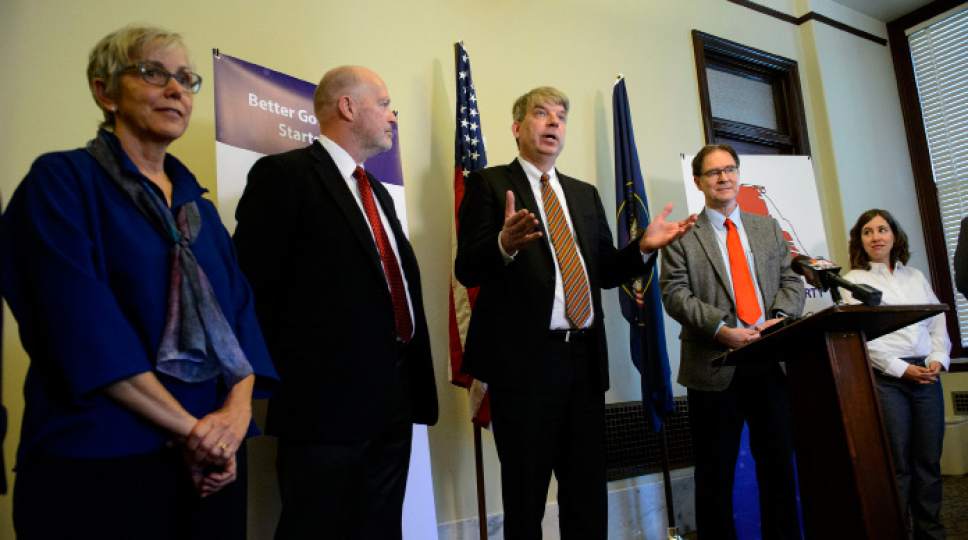This is an archived article that was published on sltrib.com in 2017, and information in the article may be outdated. It is provided only for personal research purposes and may not be reprinted.
The lawyer for Jim Bennett and his new United Utah Party argued in federal court Friday that unreasonable state rules would have required them to magically read minds in order to qualify for a special election to replace Utah Rep. Jason Chaffetz.
Only by foreseeing months early that Chaffetz would resign could UUP have met state deadlines, argued attorney Bryan Sells.
"If what one has to do to get on the ballot is be a soothsayer," Sells told a Salt Lake City courtroom, "that is a pretty high burden."
U.S. District Judge David Nuffer agreed, to a point. He said the state's central argument against Bennett is that an expedited process was needed for the election and it "cannot accommodate a new party" in the time normally required to certify one.
Assistant Utah Attorney General David Wolf disputed Sells' claim, saying the UUP could have made it onto the ballot had it started forming before Chaffetz announced his resignation — and Wolf noted the party had discussed doing exactly that.
"Shouldn't they have moved forward with that process at an earlier day?" he asked.
Bennett said after Friday's three-hour court hearing that the judge "recognizes for us to have participated on the ballot, we would have had to read everybody's mind before the special election was even talked about.
"I think I'm going to get on the ballot," he added.
Bennett said his new party's formation plans were built on the assumption that 2018 would be its first chance to appear on a state ballot.
"We had no idea Jason Chaffetz was not going to finish out his term when we started the conversations about this party, so there was no urgency to get ready for a special election that we didn't know was going to happen," Bennett said.
The party's suit claims state election rules have unfairly blocked their access to the ballot. Nuffer took the matter under advisement, but said he will rule soon on the party's motion for a temporary restraining order.
"Our rule is always to be right, and then to be quick. Not in the reverse order," Nuffer said, adding that the case is "fascinating."
Lt. Gov Spencer Cox earlier refused to accept petition signatures collected by Bennett to run under the UUP banner, saying the party did not officially exist at the candidate filing deadline because separate signatures to allow its formation had yet to be verified.
Bennett, a son of the late three-term Sen. Bob Bennett and a registered Republican prior to Donald Trump's presidential run, tried to get the state to accept his petition temporarily until the party was certified, but state officials say Utah law bars that option.
The UUP has since been certified.
Sells argued the state could have set up a process to allow new parties to participate, but simply did not foresee the need — so the process it adopted barred Bennett and his party.
The UUP did not announce its attempt to form or field a candidate until shortly after Chaffetz announced he would resign — well after Cox's office had approved a series of state election deadlines.
Nuffer noted that all the decisions regarding the election process were being made by Republicans, and said it is important to ensure that the GOP's dominance in the state does not block fair ballot access by others.
That prompted Bennett after the hearing to say, "The idea of perpetuating a one-party state is not something that this judge seems to be sympathetic to."
Bennett questioned if Republican officials' decisions were political. "I can't see reasonable reason for them to have been so adamant about not giving Utah voters another choice," he said. "So it seems to be there's a political component about that."
With ballot access in limbo, Bennett said Friday that he continues to campaign — including appearances in parades and at community events.
But resolving the issue, he said, "will make raising money a whole lot easier."
"I represent the mainstream of where Utah voters really are," Bennett said. "The Republicans and Democrats have gone so far to the extreme that the people in the middle don't have a political home."
If he and his new party lose the case, Bennett said it would consider an appeal, but he said he has not yet considered whether to run as a write-in candidate.
"We saw this election as an opportunity to introduce the party to the state," Bennett said.
@LeeHDavidson



